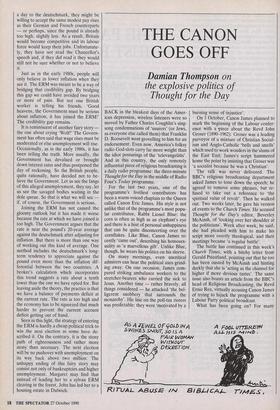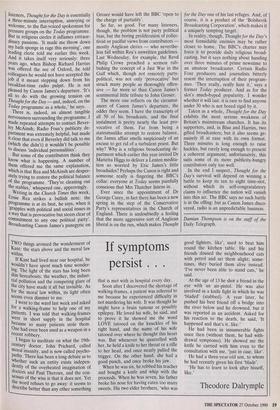THE CANON GOES OFF
Damian Thompson on
the explosive politics of Thought for the Day
BACK in the bleakest days of the Amer- ican depression, wireless listeners were so moved by Father Charles Coughlin's sing- song condemnations of 'usurers' (or Jews, as everyone else called them) that Franklin D. Roosevelt went grovelling to him for an endorsement. Even now, America's folksy radio God-slots carry far more weight than the idiot posturings of the lelevangeliSts'. And in this country, the only remotely influential piece of religious broadcasting is a daily radio programme: the three-minute Thought for the Day in the middle of Radio Four's Today programme.
For the last two years, one of the programme's liveliest contributors has been a warm-voiced chaplain to the Queen called Canon Eric James. His style is not unlike that of the programme's most popu- lar contributor, Rabbi Lionel Blue: the, corn is often as high as an elephant's eye and there is a hint of personal unhappiness that can be quite disconcerting over the cornflakes. Like Blue, Canon James re- cently 'came out', describing his homosex- uality as 'a marvellous gift'. Unlike Blue, though, he wears his politics on his sleeve.
On many mornings, even uncritical admirers can hear the political axes grind- ing away. On one occasion, James com- pared striking ambulance workers to the stretcher-bearers who carried the sick to Jesus. Another time — rather bravely, all things considered — he attacked 'the bel- ligerent snobbery that surrounds the monarchy'. His line on the poll-tax rioters was predictable: they were 'motivated by a burning sense of injustice'.
On 1 October, Canon James planned to mark the beginning of the Labour confer- ence with a piece about the Revd John Groser (1890-1962). Groser was a leading purveyor of a mixture of Christian Social- ism and Anglo-Catholic 'bells and smells' which used to work wonders in the slums of the East End; James's script hammered home the point by insisting that Groser was `a socialist because he was a Christian'.
The talk was never delivered. The BBC's religious broadcasting department asked James to tone down the speech; he agreed to remove some phrases, but re- fused to take out a reference to 'the spiritual value of revolt'. Then he walked out. Two weeks later, he gave his version of events to the Church Times. He accused Thought for the Day's editor, Beverley McAinsh, of 'looking over her shoulder at the politicians'. Week after week, he said, she had pleaded with him to make his script more overtly theological, and their meetings became 'a regular battle'.
The battle has continued in this week's Church Times, with a bitchy letter from Gerald Priestland, pointing out that he too has been ousted by McAinsh and hinting darkly that she is 'acting as the channel for higher if more devious tastes'. The same issue also boasts an article from the BBC's head of Religious Broadcasting, the Revd Ernie Rea, virtually accusing Canon James of trying to hijack the programme with a Labour Party political broadcast.
What has been going on? For many
RITUAL AB LIS IN SI Bid CAL-- 7-1/4.5 • listeners, Thought for the Day is essentially a three-minute interruption, annoying or welcome, to the flat-voiced spokesman for pressure groups on the Today programme. But in religious circles it inflames extraor- dinary passions. 'It made me throw down my bath sponge in rage this morning', one leading cleric told me earlier this week. And it takes itself very seriously: three years ago, when Bishop Richard Harries was offered the see of Oxford, he told Fnlleagues he would not have accepted the job if it meant stepping down from his breakfast-time radio pulpit. He is not Pleased by Canon James's departure. 'It's all to do with the growing tension on Thought for the Day — and, indeed, on the Today programme as a whole,' he says. There is, indeed, an almost tangible nervousness surrounding the programme. I made repeated attempts to contact Bever- ley McAinsh; Radio Four's publicity de- partment was extremely helpful, but made It clear that even if Beverley did talk to me (which she didn't) it wouldn't be possible to discuss 'individual personalities'. But some of the contributors think they know what is happening. A number of them offered me the same explanation, which is that Rea and McAinsh are desper- ately trying to restore the political balance of the programme. 'They're cleaning out the stables,' whispered one, approvingly. Writing in the Church Times this week, Ernie Rea strikes a bullish note: the programme is at its best, he says, when it grapples with political and social issues in a way that is provocative but steers clear of Commitment to any one political party'. Broadcasting Canon James's panegyric on Groser would have left the BBC 'open to the charge of partiality'.
So far, so good. For many listeners, though, the problem is not party political bias, but the boring proliferation of collec- tivist or pacifist views from contributors mostly Anglican clerics — who neverthe- less fall within Rea's unwritten guidelines. Last Wednesday, for example, the Revd Philip Crowe preached a sermon rub- bishing the concept of a Just War in the Gulf which, though not remotely party- political, was not only 'provocative' but struck many people as thoroughly offen- sive — far more so than Canon James's sentimental little tribute to John Groser.
The more one reflects on the circumst- ances of Canon James's departure, the odder they seem. I have the transcripts of all 50 of his broadcasts, and the final instalment is pretty nearly the least pro- vocative of them. Far from being a statesmanlike attempt to restore balance, the James affair smells suspiciously of an excuse to get rid of a turbulent priest. But why? Why is a religious broadcasting de- partment which earlier this year invited Dr Marietta Higgs to deliver a Lenten medita- tion so worried by Eric James's little broadsides? Perhaps the Canon is right and someone really is fingering the BBC's collar: everyone at Today seems painfully conscious that Mrs Thatcher listens in.
Ever since the appointment of Dr George Carey, in fact there has been a new spring in the step of the Conservative Party's representatives in the Church of England. There is undoubtedly a feeling that the more aggressive sort of Anglican liberal is on the run, which makes Thought for the Day one of his last refuges. And, of course, it is a product of the 'Bolshevik Broadcasting Corporation', which makes it a uniquely tempting target.
In reality, though, Thought for the Day's most formidable enemies may be rather closer to home. The BBC's charter may force it to provide daily religious broad- casting, but it says nothing about handing over three minutes of prime newstime to an amateur broadcaster. Certain Radio Four producers and journalists bitterly resent the interruption of their program- mes. 'They really, really hate it,' says a former Today producer. And as for the slot's much-hyped popularity, I wonder whether it will last: it is rare to find anyone under 30 who is not bored rigid by it.
Taken as a whole, Thought for the Day exhibits the most serious weakness of Britain's mainstream churches. It has its supporters, and, in Blue and Harries, two gifted broadcasters; but it also seems ge- nuinely ill at ease with its own format. Three minutes is long enough to raise hackles, but rarely long enough to present a coherent argument; unfortunately, this suits some of its more publicity-hungry contributors only too well.
In the end I suspect, Thought for the Day's survival will depend on winning a battle to keep its ten to eight time-slot, without which its self-congratulatory claims to influence the nation will vanish into thin air. The BBC says no such battle is in the offing: but as Canon James disco- vered, radio is an unpredictable business.
Damian Thompson is on the staff of the Daily Telegraph.



































































 Previous page
Previous page